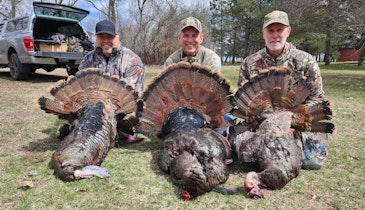By WESLEY BROWN | The Augusta Chronicle
AUGUSTA, Ga. (AP) — An eight-point buck lay in a field not far from the Burke County line, its body pelted with bullets. In a ditch along U.S. Highway 1, two whitetail does died from gunshot wounds, their carcasses rotting in the hills. And at the Phinizy Swamp Wildlife Management Area, game wardens searched for wood ducks that a tipster said had been killed by law-breaking hunters, apparently just for the thrill of it.
The reports keep coming in: deer, ducks and Eastern wild turkeys killed in a wave of poaching that state conservation rangers in the Augusta area expect to increase. The firearms deer hunting season began in Georgia and South Carolina this month.
Local authorities said they are seeing more organized "night hunts" and "roost shoots&" — groups of homegrown poachers and bored adolescents who park along public roads and camp on private property after sunset to kill deer and ducks as they return to burrows and nests.
To protect their land, the wildlife population and the integrity of the state's fee collection system, local hunting groups are gating reservations, marking stands and monitoring social media sites to catch poachers who post online pictures of large kills.
State rangers say the best way to stop the illicit act is to file complaints with Georgia's Turn in Poachers program, a 25-year-old awareness campaign that pays $100 for any tips that lead to the arrest of those who "deprive citizens of the state's natural resources by illegally taking wildlife," the program's mission states.
"It's all for show," Cpl. Ben Payne, Richmond County's state conservation ranger, said as he hauled off an abandoned deer carcass. "They have to brag to somebody, and that's usually where the Turn in Poachers program comes into play."
As with all criminal enterprises, poaching centers on big kills and big egos, said Capt. Mike England, who oversees the TIPS program for the Georgia Department of Natural Resources.
Though only eight rewards have been issued in Georgia this year — well below the average of 25 — rangers expect that number to double or triple during deer season, which runs through Jan. 1.
They say tips are typically called in by jealous hunters, angry property owners or betrayed relatives and friends.
"A lot of people are not even interested in the reward," England said. "They just want poachers caught and kept off their hunting property or from shooting at night around their house."
Watching a poacher pay up to a $1,000 fine, spend up to a year in jail or lose his hunting privileges seems to be a much better reward than the $100, England said.
Though Payne said he averages eight poacher tips a week, state records show the program has not issued a reward in Richmond County this millennium.
Payne said Richmond County's tips are mostly from fearful residents who hear gunshots in the dark or poachers who spend the night on hunting club properties and discover others on their turf.
"Sometimes our best complaints come from criminals themselves," Payne said.
Last season, he said, he received a tip from a Facebook user whose friend posted a photo of an eight-point buck he had killed. In the background of the photo, there was bait on the ground.
"I had been to the place where the picture was taken and knew exactly where it was," Payne said. "After getting all my facts together, I approached the suspect, who confessed to shooting the deer illegally."
In Columbia and Jefferson counties, tips have led rangers to seven arrests in the past three years and the TIPS program to reward more than 20 sources in the past two decades.
In March, Columbia County Ranger 1st Class Bobby Timmerman caught a poacher in Appling hunting turkeys over cracked-corn bait on private property. He had been investigating an anonymous tip for more than a year.
In 2012, two poachers were arrested in Jefferson County on six violations: hunting waterfowl with a lead shot, exceeding the bag limit, hunting during illegal hours, hunting without a license, hunting without a federal stamp and possessing an illegally caught duck.
A year before that, a group of birdwatchers led wardens to four poachers in Columbia County who were hunting teal and mallard ducks after dusk at a swamp between Louisville Road and William Few Parkway.
When the bystanders heard gunfire and dogs howling, they called 911 and stayed on the phone with authorities to guide them to the suspects, who were caught with marijuana and some illegally caught ducks.
"We do not want people to be fearful in Columbia County," Timmerman said. "We'll let them remain anonymous and receive cash rewards, because we want the program to keep going and gain awareness."
Timmerman's mindset has led to great trust in the hunting community.
Tom Boots, the president of Two Creeks Hunting Club, said his group has provided the ranger with the gate lock combination to the 430-acre property it leases from a timber company.
"We suspect that we have people coming onto our property and poaching, but we have never caught anyone in the act," Boots said, adding that sometimes his club members will encounter an unmarked stand or an abandoned animal carcass.
"Poaching counteracts all the good of hunting," Boots said. "Hunters invest a lot of time and money into their property, and to have a poacher walk onto their land and take away their kill is a very aggravating thing. It robs them of their hard work."
Payne agreed but said that more than anything, poaching is a safety hazard, especially cases of roadside hunting, in which homes are not immediately visible beyond a highway shoulder.
"We only have but one ranger per county," Payne said. "If not for the public, it would be hard to stop the poaching problem."
———
Information from: The Augusta Chronicle , www.augustachronicle.com






